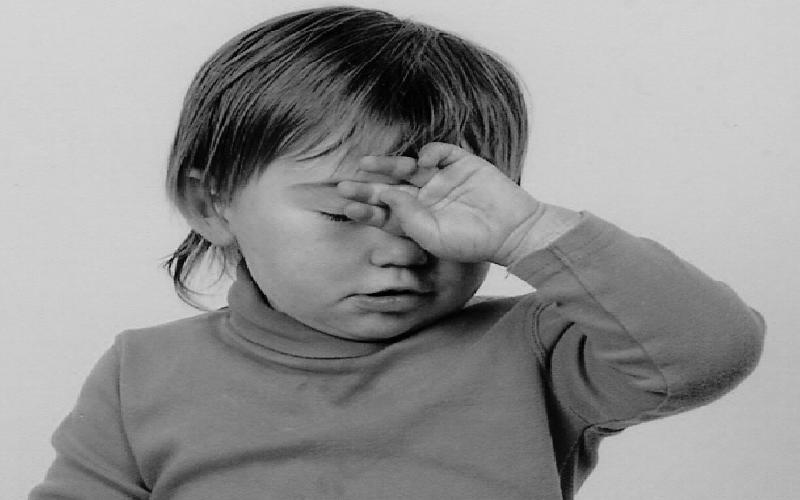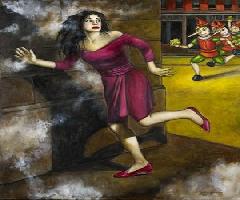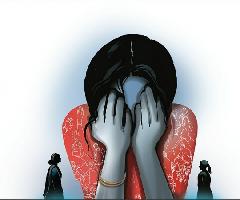Lust is the basic and most prominent instinct of human existence and being. It is the pivotal point of human activity, productivity and generation etc. It is guiding force of human existence and activity. Every activity of human life involves this in one way or the other. Sometimes it is hidden from human purview and works secretly, insidiously and silently in the background. Sometimes it becomes very violent and aggressive giving birth to anti social acts and anti social behavior of rascals and scoundrels. Almost all anti social behavior of men arise from this powerful animalistic instinct. Dr Sigmund Freud
calls this all pervasive and all powerful instinct as id.
When lust instinct is thwarted or we forcibly try to annihilate it leveling it as something “dirty” or “sin and uglyful”from our lives, the humans tend to become lunatic and loose control of the self and let loose a reign of destruction and terror. The lust instinct is so overwhelming and powerful that can not be defeated and annihilated easily. When once it is arisen or awakened it never dies and moves background in many forms and shapes. The lust wishes its full gratification and fulfillment. When it is regressed or suppressed and it becomes all the more powerful and potent. The cultured or rationally refined socio religious self of man does not allow it its easy satisfaction and normal course. So it is twisted and distorted giving birth to much kind of perversions. It is very skilful, meticulous and maneuvering in nature. So there is constant unending conflict or tug of war between animalistic self of man and its super ego. And this conflict is not easily resolved. Sometimes the net work of so many contrasting and conflicting ideas/ emotions becomes so complex and intriguing that it starts torturing and threatening the normal self of man and his very existence. Out of this complex arise the feelings or emotions of shame and guilt furthering widening its base in the form of extremely low esteem, inferiority and worthlessness of the self. A stage in the advancement of this complex is reached when the victim starts hating or him or her self. He starts having delusion about his self as something “dirty “or “ugly” he is so engrossed in worthlessness that he considers himself as chit or stool. He becomes very conscious of his dirty and “unworthy self”. He starts hiding from the public view. He thinks that all people are plotting against his self and are his bitter enemies. There arises estrangement between him and society. All relationships seem him to be treacherous and deceitful. This infract is the projection of his self. He starts projects his feeling and emotions on the family and society. He is not only alienated from his family and surroundings but from his self also. In the extreme stage here we have what the psychologist had leveled as split or divided self or multiple personality. All psychology in a way takes its birth or is originated from “ungratified suppressed sexual feelings”. Or it may degrade the personality into many types of manias and especially erotomania and megalomaniac. In megalomania the victim becomes very narcissistic and ego-centric or rather eccentric. He suffers from pride and vanity. Arrogance becomes the hallmark of the behavior of such a personality. The psyche of such a victim is very restless, anxious and suspicious
How the feelings of shame or guilt are deeply rooted in “sexual feelings” can be seen from the legendary story or trinity of plays, written by Sophocles the renowned Greek dramatist. When the hero of the play king Oedipus comes to know the fact that he had married his own mother and from the wedlock with his mother he had even produced progeny. He is so overwhelmed by the feeling of shame and guilt that he pricked pins in his eyes and becomes blind lamenting and repenting his sexual act. He does penance by self aggression methods and
inflicting deep injuries on the self. The feelings of remorse overtake him. Every guilt complex almost arises like this. Out of compulsion the victim eats the “forbidden sweetened fruit” and thereafter repents his folly. A vicious circle in the psyche of the victim starts never letting him free entirely.
What is guilt? By definition the Guilt is strong feeling or emotion of remorsefulness, unworthiness and responsibility for some committed offense, crime or wrong. The committed offense may be real or fanciful.
It may be purely imaginary or delusionary. The guilt conscience has strong feeling of committing some crime.” Committed the crime he has, is the grand rubric that runs background in the psyche of concerned person. This feeling of offense goes on tormenting or torturing the perpetrator endlessly and obsessively. Guilt is the heightened feeling of committed something wrong but it may not be wrong actually. Shame is the side or secondary complimentary emotion that always interchangeably moves or coincides with guilt in many instances. In common parlance these terms are used interchangeably and confusedly but from the perspective of psychology these are different in connotation and temper. People generally confuse shame with guilt and vice versa. The distinction and difference is very obvious. One can not be substituted for the other but one may accompany the other. The same action may give rise to the feelings of shame and guilt simultaneously. Shame is how we feel bad and dirty about ourselves and sense our self. It is very painful and anguished feeling how our self appears to other people or to one’s own self? The self appears “dirty and ugly” to the view of self and others. When the person feels ashamed of others or from self than it is the dominant feeling of shame. The real victim of shame feels ashamed of others but of his self also. But when the person feels remorse or his conscience pricks him for the something wrongful done to others or a committed crime than it is guilt. “Forbidden feeling” is very strong in guilty and this original feeling shows itself in a masqueraded form or in cover up feeling. We always compensate and cover up the uncivilized animalistic instinct in a refined and cultured way so that the society may not feel hostile to its fulfillment. The compensation is in a way a cunning and deceitful method of gratification. The victim of guilt repeatedly and sweepingly asks the self, “why did I committed the heinous crime or folly and I must be punished for that”. It appears as if he has two selves one dictating and commanding the other and passing judgment on other. The superego itself becomes the judge and declares punishment by self injury wangling head against the wall or beating one’s head with hands or by pulling one’s own hairs of head forcibly. He may bleed his body during some such episode of guilt and anxiety by hurting his self.
The Shakespeare’s sonnet 129 describes exactly the hidden link between lust, shame and guilt in a splendid, poetical and symbolic manner. It says like this:
“The expense of spirit in a waste of shame
The lust in action, and till action,
Lust is perjured, murd’rous, bloody, full of blame,
Savage, extreme, rude, cruel, not to trust,
Enjoy’d no sooner but despised straight.”







